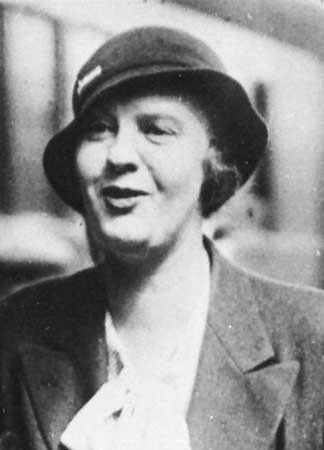Thompson, Dorothy
American journalist and writer
born July 9, 1893, Lancaster, N.Y., U.S.
died Jan. 30, 1961, Lisbon, Port.
 American newspaperwoman and writer, one of the most famous journalists of the 20th century.
American newspaperwoman and writer, one of the most famous journalists of the 20th century.The daughter of a Methodist minister, Thompson attended the Lewis Institute in Chicago and Syracuse University in New York (A.B., 1914), where she became ardently committed to woman suffrage. After World War I she went to Europe as a freelance correspondent and became famous for an exclusive interview with Empress Zita of Austria after Emperor Charles's unsuccessful attempt in 1921 to regain his throne. In 1925 she became head of the Berlin bureau of the New York Evening Post and met the novelist Sinclair Lewis (Lewis, Sinclair). She married him in London in 1928 (her second of three marriages). On their return to America, Thompson led a domestic life for a few years but, back in Europe, she began reporting about the Nazi (Nazi Party) movement, infuriating Adolf Hitler (Hitler, Adolf) so much that, by his own personal order in 1934, she became the first American correspondent to be expelled from Germany. In 1936, for the New York Herald Tribune, she began her newspaper column “On the Record,” which became hugely popular and eventually was syndicated to as many as 170 daily papers (1941–58). On network radio and in popular speeches, she warned against Hitler, and Time magazine rated her the country's second most popular woman (after Eleanor Roosevelt).
Thompson wrote many books, including New Russia (1928), I Saw Hitler! (1932), Refugees: Anarchy or Organization (1938), Let the Record Speak (1939), and The Courage to Be Happy (1957). In her final years, she continued to write a monthly column for the Ladies' Home Journal. She was president of the American PEN club from 1936 to 1940.
- lead-210 dating
- Leadbelly
- Leaders of Germany
- Leaders of Ireland since 1922
- Leaders of Muscovy, Russia, the Russian Empire, and the Soviet Union
- Leading International Tourist Destinations
- Leading International Tourist Destinations 1
- Leading International Tourist Destinations, Table
- Leading Oil Countries, Table
- lead poisoning
- lead processing
- Leadville
- leadwork
- leaf
- leaf beetle
- leafbird
- leaf blister
- leaf cactus
- leafcutter ant
- leaf-cutter bee
- leaf fibre
- leaf fish
- leafhopper
- leaf insect
- leaf miner